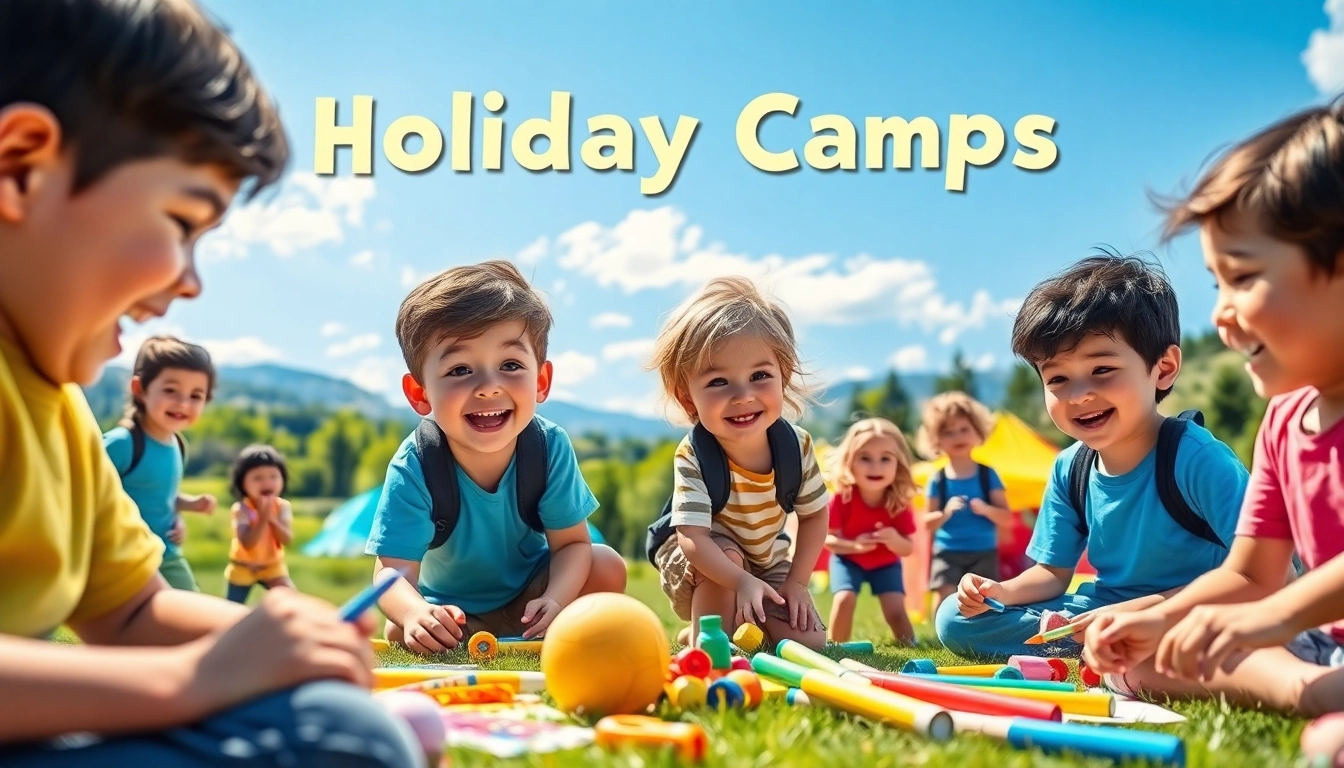Introduction to Holiday Camps
Overview of Holiday Camps
Holiday camps have become an essential part of youth recreation and development, providing children with opportunities to engage in various activities during school breaks. These camps usually take place during summer, winter, and spring breaks, offering organized environments for children to socialize, learn new skills, and immerse themselves in fun experiences. Holiday camps vary widely in terms of themes, activities, and duration, attracting children from diverse backgrounds and interests. Choosing the right holiday camp can help nurture a child’s passions, expose them to new hobbies, and even enhance their interpersonal skills. To explore more about the options available, you can check out these exceptional holiday camps.
Benefits of Attending Holiday Camps
Holiday camps present numerous benefits that collectively contribute to the development of children. Those benefits include:
- Social Skills Development: Camps allow children to meet peers from various backgrounds, facilitating relationship-building and improving social interaction skills.
- Skill Acquisition: Many camps focus on specific themes—sports, arts, science—that help children acquire new skills related to those activities.
- Physical Activity: Structured activities encourage children to stay active, promoting fitness and a healthy lifestyle.
- Resilience Building: Facing new experiences can help build resilience and independence, as children learn to navigate challenges and adapt to new environments.
- Increased Confidence: Participating in new activities and overcoming fears boosts children’s self-esteem and body image.
Types of Activities Offered at Holiday Camps
Activities available at holiday camps can range widely, catering to various interests and preferences. Some popular options include:
- Sports Camps: From soccer and basketball to swimming and gymnastics, sports camps provide children a chance to enhance their athletic skills.
- Arts Camps: Focused on creativity, these camps often feature painting, drawing, dance, music, and drama activities.
- Adventure Camps: Combining outdoor activities with nature exploration, adventure camps include hiking, rock climbing, and canoeing.
- STEM Camps: These camps are designed for fostering interest in Science, Technology, Engineering, and Mathematics through interactive projects and experiments.
- General Day Camps: Often a mix of activities, general day camps offer sports, arts, games, and outings to provide a well-rounded experience.
Choosing the Right Holiday Camp
Factors to Consider When Selecting Holiday Camps
Selecting the right holiday camp requires thoughtful consideration of various aspects to ensure it aligns with a child’s needs and interests. Here are key factors to evaluate:
- Child’s Interests: Consider what your child enjoys—sports, arts, or science—when selecting a camp that aligns with their passions.
- Location: The proximity of the camp can greatly impact logistics, including travel time and ease of drop-off/pick-up.
- Duration: Some camps offer week-long sessions, while others may operate for longer periods. Choose one that fits your family’s schedule.
- Cost: Budget is a crucial consideration; ensure the camp’s fees are manageable while providing valuable experiences.
- Facilities and Staff Qualifications: Examine the camp’s facilities and the qualifications of staff to ensure a safe, well-monitored environment.
How to Match Interests and Skills with Holiday Camps
To find a suitable holiday camp for your child, it’s essential to assess their interests and skills. Here are steps to effectively match them:
- Assess Interests: Engage your child in a conversation about their hobbies and interests. Use visual aids or visit websites showcasing different camps to gauge excitement.
- Evaluate Skills: Consider your child’s strengths and weaknesses. For instance, a child with a knack for music may thrive in an arts camp, while a sporty child might prefer a sports camp.
- Discuss Goals: Talk to your child about what they want to gain from the camp experience, whether it’s making friends, learning something new, or developing a talent.
- Research Options: Look for camps that align with your findings. Review their curriculums, and reach out for additional questions or concerns.
- Involve Your Child: Allow your child to take part in the final decision-making to ensure they are excited and invested in their camp experience.
Understanding Different Holiday Camps Themes
Understanding the wide array of camp themes can help in narrowing the options. Here are a few key themes commonly found:
- Sports-Focused Camps: These camps specialize in sports training and competitions, appealing to young athletes.
- Artistic Expression Camps: Catering to aspiring artists, these camps focus on developing creative skills through a variety of artistic mediums.
- Adventure and Wilderness Camps: Ideal for nature lovers, these camps offer outdoor activities in scenic environments to engage in exploration and teamwork.
- Academic Enrichment Camps: Focused on educational development, these camps provide structured learning in subjects like math, science, and coding.
- Specialized Camps: These cater to specific interests, such as robotics, theater, or cultural themes, allowing children to dive deep into their passions.
Preparing for Holiday Camps
What to Pack for Holiday Camps
Proper packing is crucial for a successful camp experience. Here’s a checklist to guide you in preparing your child:
- Clothing: Pack appropriate clothing suitable for various activities, including swimsuits, athletic wear, and casual attire.
- Sunscreen and Hat: Essential for outdoor activities, ensure your child is protected from sunburn.
- Personal Items: Include toiletries, towel, and a reusable water bottle for hydration.
- Comfort Items: Consider including a favorite stuffed toy or blanket for emotional comfort.
- Snacks: Healthy snacks that are easy to pack can provide extra energy during activity-filled days.
Health and Safety Guidelines at Holiday Camps
Safety is paramount in any camp setting. Therefore, it’s essential to understand and adhere to health and safety guidelines:
- Emergency Contacts: Always provide up-to-date emergency contact information to camp authorities.
- Health Information: Inform the camp about any medical conditions, allergies, or dietary restrictions your child may have.
- Child’s Orientation: Prior to the camp start, participate in any offered orientation to familiarize your child with procedures and expectations.
- Safety Briefings: Ensure your child attends safety briefings on activities they will be participating in to understand risks and protocols.
- Regular Check-Ins: Encourage your child to communicate with you about their experiences and any concerns they may have during their time at camp.
What to Expect on Your First Day at Holiday Camps
The first day of camp can be both exciting and nerve-wracking for children. Here’s what to expect:
- Check-In Process: Expect a structured check-in process where staff will verify participation and distribute schedules.
- Meeting Staff and Other Campers: Children will be introduced to camp leaders and fellow campers, fostering a sense of community from the beginning.
- Orientation Activities: Most camps start with orientation activities to guide children through the facilities and explain camp rules.
- First Activities: Children will dive into introductory activities tailored to connect them with others and set the tone for the rest of the camp period.
- Parental Communication: Parents are encouraged to maintain open lines of communication to address any anxiety or questions their children may have.
Maximizing the Holiday Camps Experience
Making New Friends at Holiday Camps
One of the most rewarding aspects of holiday camps is social interaction. Here are ways to help your child make friends:
- Encourage Openness: Remind your child to approach new campers with openness and friendliness, fostering positive interactions.
- Group Activities: Many camps include group activities that inherently require teamwork. Encourage participation to strengthen bonds.
- Common Interests: Help your child identify common interests with others through casual conversations, opening paths to friendships.
- Be Approachable: Encourage your child to smile and engage with others; body language plays a critical role in forming connections.
- Share Experiences: Offer your child ideas about sharing their experiences, as storytelling can create interest and camaraderie.
Engaging Fully in Activities at Holiday Camps
Active participation can significantly enhance a child’s camp experience. Here are strategies for full engagement:
- Set Goals: Talk with your child beforehand about setting personal goals for the camp duration, focusing them on achieving specific milestones.
- Try New Things: Encourage your child to step outside their comfort zone by trying new activities, which can lead to exciting discoveries.
- Collaborate with Peers: Participation in team-oriented tasks can lead to a greater sense of achievement and accountability.
- Stay Positive: Cultivate a positive mindset to help children navigate challenges they may encounter, viewing them as growth opportunities.
- Reflect on Experiences: Engage your child in discussions after activities, highlighting learning moments and key takeaways from the day.
Building Lasting Memories at Holiday Camps
Creating enduring memories during holiday camps relies on embracing the experience. Here are tips to help capture those moments:
- Document Experiences: Encourage your child to maintain a journal or scrapbook detailing their daily adventures, which they can revisit later.
- Take Photos: If allowed, photograph significant moments—friendships formed, successes in activities— to cherish later.
- Participate Fully: Actively engaging in as many activities as possible can lead to more memorable moments, allowing children to reflect positively on their experiences.
- Share Stories: Facilitate regular sharing sessions at home where children can recount stories of their camp days with family.
- Follow Up with Camp Friends: Encourage children to stay connected with their camp friends through calls, texts, or planned meet-ups to extend those friendships beyond camp.
Post Holiday Camps Reflection
Reflecting on Experiences from Holiday Camps
Post-camp reflection is vital for understanding the impact of the experience. Here’s how to guide your child through that process:
- Discuss Camp Highlights: Sit down with your child and discuss their favorite moments from camp, allowing them to express what they enjoyed most.
- Evaluate Growth: Ask your child to reflect on personal growth and skills they have developed throughout their camp experience.
- Encourage Open Dialogue: Foster a safe space for your child to express any fears or concerns they faced during camp, promoting emotional processing.
- Create a Memory Book: Provide opportunities to compile photos and notes from camp into a memory book to help them visualize their experiences.
- Discuss Future Goals: Inquire about their future interests and how they might want to build on their camp experience in future settings.
How Holiday Camps Impact Personal Growth
Holiday camps significantly influence personal growth, developing various life skills. Here are ways they contribute:
- Leadership Skills: Participating in group activities helps children develop leadership qualities as they learn to guide their peers.
- Communication Abilities: By interacting with peers and camp staff, children learn to articulate thoughts and feelings, enhancing their communication skills.
- Problem-Solving Skills: Overcoming challenges required during camp activities fosters critical thinking and adaptability, essential for personal success.
- Emotional Intelligence: Camps provide opportunities for children to recognize, understand, and manage their emotions in various situations.
- Independence and Resilience: Navigating experiences away from home encourages independence and resilience that serve children well throughout life.
Staying Connected After Holiday Camps
Maintaining connections formed during camp can have lasting positive effects. Here are ways to keep those bonds strong:
- Exchange Contact Information: Encourage your child to exchange contact details with their new friends to facilitate ongoing communication.
- Organize Reunions: Consider setting up informal get-togethers to allow camp friends to reconnect and share memories.
- Join Online Communities: Many camp organizations offer online forums or social media groups for campers to interact after the camp period.
- Encourage Shared Interests: Help children pursue shared interests through clubs, classes, or activities out of camp, fostering ongoing friendships.
- Stay in Touch with Camp Staff: Encourage your child to send thank-you notes to staff, reinforcing connections and appreciation for their efforts.






Leave a Reply